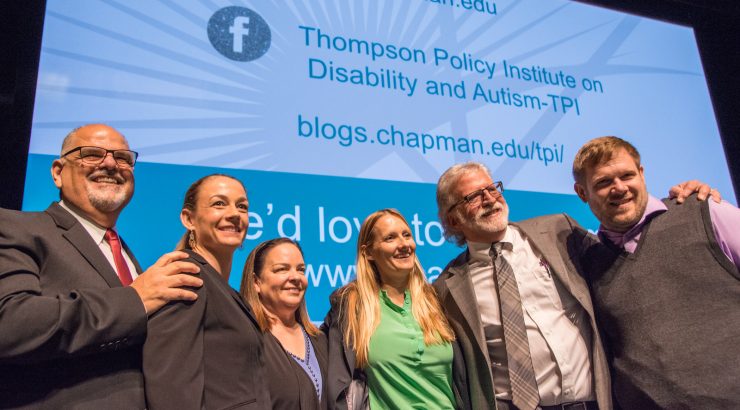Thompson Policy Institute 2nd Annual DisAbility Summit The Summit: A look at the research and the people who make change in the world of disability
May 24, 2017
On Tuesday, May 2nd, the Thompson Policy Institute held its 2nd Annual DisAbility Summit. At the Summit, a group of like-minded individuals gathered together for a morning of research, and the celebration of local dedicated professionals who were honored for the excellent work they have done in the field of disability. The Summit provided groundbreaking research relevant not just to Orange County, but stretching across the United States.
Speaker Stephen Hinkle opened the morning with his keynote address: “Stephen’s Story of Growing up with Autism.” A former special education student, Stephen moved into general education in fifth grade, and later pursued a master’s degree in special education as a young adult. Stephen now travels across the United States to share his story, as well as provide input on policy surrounding issues of disability. As an Institute that values the information and perspective of those who are disabled, the Thompson Policy Institute found it imperative to involve those directly related to disability in the Summit. Stephen’s words provide able-bodied people with important insight that cannot otherwise be obtained.
Following the keynote, Drs. Griffiths, Cosier, and Cardinal shared their research, each in a specialized area of interest. Dr. Amy-Jane Griffiths discussed the Orange County Transition Initiative (OCTI) which supports taking research and turning it into local action. This network of transition programs and organizations will share data and work together to improve transition outcomes in areas such as employment, post-secondary education, and housing, for individuals with disabilities.
On the school front, Dr. Meghan Cosier explored the variability in access to general education for students with intellectual disability and autism. This study examined factors that were associated with access to general education contexts for students with significant disabilities. Variables highlighting significant difference between non-inclusive and inclusive districts were identified such as; median family income, per pupil expenditure in special education, as well as percent of students with intellectual disability, and students who are black. Similarly, variables where there was not a significant difference between non-inclusive and inclusive districts identified; students with limited English proficiency, percent of Asian/Pacific Islander students, percent of American Indian students, percent of White students, as well as percent of students with a disability. Moving forward, the research team is expanding the study to include the 1,025 school districts in California.
The final research presentation featured Dr. Don Cardinal who explored the increase in rate of Autism. The initial research effort was focused on Orange County and the state of California, and has since expanded to encompass a total of six states. These states were selected for their size and significance. Over the course of 16 years (2000-2016) the prevalence of Autism has increased by 684% across the six-state sample, although the growth in special education coincides with the population growth in general education. As researchers examined the pattern of increase of the 13 federal disability categories, across the sample size, it was found that a decrease in the eligibility of specific learning disability (SLD) occurred. Dr. Cardinal posited that there is not reassignment of eligibility (students previously eligible under SLD, now becoming eligible under autism), it is likely new students moving into the system with specific learning and behavior characteristics are now initially eligible under autism.
The research presented at the Summit introduced new work in the Thompson Policy Institute, as well built upon existing knowledge and research in the field. Further, the TPI discussed their plans to expand their research and grow as an institute. The afternoon included a celebration of three individuals who have dedicated their lives to working in disability; Dr. Joe Donnelly, Linda O’Neal, and Dr. Richard Rosenberg.
Dr. Donnelly is a Pediatric Neurologist, Clinical Professor of Pediatrics at UCI, and Medical Director of The Center for Autism and Neurodevelopmental Disorders. Dr. Donnelly has a special qualification in child neurology. During this celebration, Dr. Donnelly was applauded for his work supporting families and children with autism and other developmental disabilities. Though unable to attend, Dr. Donnelly was represented by a colleague who received the award on his behalf.
Linda O’Neal, a long-time educator and adjunct faculty at Chapman University, was congratulated for her efforts teaching students, and adults, as well as making change in programming for adults with disabilities. Linda currently does work for San Diego State University Interwork Institute and the Regional Center of Orange County. She also works as a Regional Manager for the California PROMISE Initiative.
Lastly, Dr. Richard Rosenberg was congratulated for his commitment to disability, with over 30 years of teaching and administrative experience, as well as faculty membership at California State University, Los Angeles. Dr. Rosenberg is a vocational coordinator for a southern California school district and has worked for years with grants connecting Education, Rehabilitation and Developmental Disabilities services at all levels. Additionally, Dr. Rosenberg is a Regional Manager for CaPROMISE (Promoting the Readiness of Minors in Supplemental Security Income).
The Summit concluded with a speakers panel including those who were recognized for their excellence in disability, as well as the researchers who presented at the event. The Summit’s commitment to listening to the audience and responding to concerns, questions, and comments was a highlight of the afternoon. We hope that next year you can join us for a day of research on ability and disability, and become part of the cycle which perpetuates research, action, and policy.
